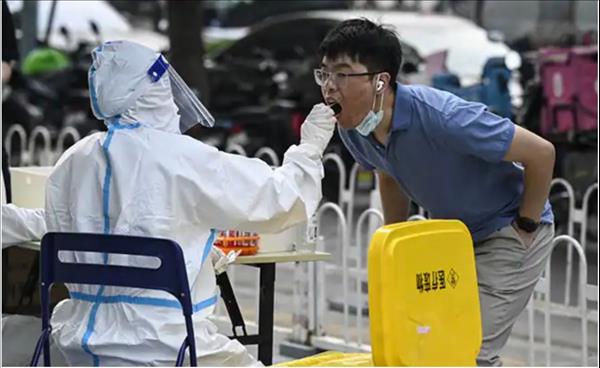(MENAFN- Asia Times) Western experts are urging China to disclose more data related to its current Covid wave, particularly the genome sequencing information that can be used to identify new mutant strains.
The United States, Japan, South Korea, India and Taiwan have recently reintroduced Covid tests for travelers from China, which will allow more people to fly overseas from January 8 as part of its retreat from“zero-Covid” restrictions. Foreign authorities are worried that deadly new Covid variants might have already emerged in the country's perceived as“unchecked” virus outbreaks.
China has completed genome sequencing on samples from 1,142 Covid patients so far this month. About 80% of the samples were reportedly BA5.2 and BF.7, which are more contagious but less pathogenic than previous strains. Chinese health officials said no new mutants had been identified.
Over the past 180 days, China has shared the DNA sequencing data of 412 Covid cases with GISAID, a public database based in Germany, compared with more than 576,000 shared by the US, according to reports.
The US Centers for Disease Control and Prevention (US CDC) has said Beijing has not shared enough genomic sequences with the world. China's foreign ministry said on Friday that the Chinese government had shared its data globally and would continue to monitor the epidemic situation in the country.

A young woman in Shenzhen has serious pneumonia as she delayed medical treatments. Photo: Screenshot / Weibo
Since China relaxed its Covid rules on December 7, the number of Covid infections has grown exponentially. A document issued by the National Administration of Disease Control and Prevention (China's CDC) said about 248 million people, or 17.6% of the 1.4 billion population, had been infected between December 1 and 20.
Some Chinese netizens said China was now trying to get its population infected as quickly as possible so the country could achieve herd immunity and refocus on economic development next year. But some others said such a strategy could result in the collapse of the country's medical system and cause unnecessary deaths.
Miu Xiaohui, a former doctor of Shanghai Changzheng Hospital Pudong, The Second Military Medical University, in a recent social media post apologized to the public for having underestimated the pathogenicity of the Omicron strains.
In retrospect, Miu said he had been wrong to call on the public not to rush to buy medicines in early December. He said this was his second big mistake after he wrongly called on people not to buy masks during the first epidemic wave in China in early 2020.
His comments came after Chinese media reports said funeral services in major cities had strained facilities over the past two weeks. It remains unclear how many people have died in the current epidemic wave.
Tedros Adhanom Ghebreyesus, Director-General of the World Health Organization (WHO), said on December 21 that the WHO was very concerned over the evolving situation in China with increasing reports of severe disease. He said China should share its data and conduct the studies the WHO had requested.
Media reports said China had shared fewer than 1% of its reported and sequenced Covid cases over the past 180 days while the US had shared more than 4% and the United Kingdom nearly 12%.
The US Centers for Disease Control and Prevention said in a statement on Wednesday that the lack of transparency from China could delay the identification of new Covid variants that pose a threat to global public health.

Xu Wenbo, head of the National Administration of Disease Control and Prevention Photo: screengrab, CCTV
Since late November, Xu Wenbo, head of China's CDC, has on many occasions detailed the country's coronavirus sequencing work.
On November 29, Xu told China Central TV that BA.5 and BF.7 were the most common Covid strains identified in mainland China. He said these variants, more contagious than previous ones, had basic reproduction numbers (R0) of up to 21, meaning that one patient could infect 21 others. He said with preventive measures, their R0 could be lowered to 2 to 3.
On December 13, Xu said BQ.1, nicknamed Hellhound, and its sub-variants had been identified in 49 Covid samples in nine provinces but they had not yet become dominant in China.
He said BQ.1 had been first identified in Nigeria in June this year and widely spread in Europe and the US in September and Japan and Singapore in October. He said there was no evidence that the variant was more pathogenic than other Omicron strains.
On December 20, Xu said in a media briefing that XBB, nicknamed Gryphon, another highly-infectious Covid variant, had been identified in 11 samples in three provinces. He said the proportion of patients infected by BQ.1 and XBB would increase but it was unlikely that the two strains would trigger a new epidemic wave.
He said China's CDC had recently launched a work plan to collect genome sequencing data from all provinces in order to set up a national database.
He said each province was required to select three cities while each of them had to choose a major hospital to do the DNA sequencing on 15 Covid samples from its clinic patients, 10 from its serious patients and all death cases on a weekly basis.
Xu told ThePaper.cn on Wednesday that China's CDC had done 1,142 genome sequencing procedures so far this month, with BA.5.2 and BF.7 representing more than 80% of all cases. He said on Friday it was not likely to see a new mutant that is both highly contagious and pathogenic.
The data he cited was in line with the Chinese CDC's internal document, which said China recorded 248 million infections between December 1 and 20 and completed genome sequencing on 1,100 cases.
In comparison, the US state of Washington with a 7.74 million population has recorded 1.88 million Covid infections and 15,000 deaths so far and completed genome sequencing on 130,577 cases since January 2021, according to the local health department. That means about 6.9% of all cases were analyzed.
read: 'white lungs' scare chinese and their travel hosts
Follow Jeff Pao on Twitter at @jeffpao3






















Comments
No comment